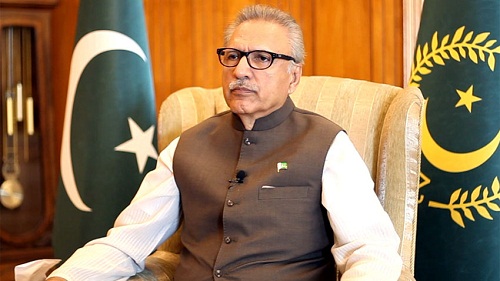DNA
Islamabad, 18 Aug: President Arif Alvi has enhanced the penalty for workplace harassment, imposed upon the Director for Human Resource Management (HRM) in NEPRA, to “dismissal from service”. He held that sending text messages to a female colleague, asking her to stay in the office beyond office hours with an ulterior motive, making unwanted advances, and intimidating her to face dire consequences in case of her refusal to assent to his unethical demands constituted harassment, and warranted no leniency.
While deciding upon a workplace harassment case, the President in his decision wrote that statements of the complainant, witnesses, CCTV footage, WhatsApp messages, and the email fully established the factum of harassment. He said that the accused himself had also admitted his guilt by implication and his only grievance before the President was regarding the severity of punishment. “The principle of reasonableness and proportionality demands that the penalty is modified to dismissal as it is commensurate with the gravity of the offence”, he added.
The President rejected the representation filed by Mr Ahmad Nadeem (the accused), Director HRM in National Electric Power Regulatory Authority (NEPRA) and changed the minor penalty of “withholding two increments” imposed by the Federal Ombudsman for Protection against Harassment of Women at Workplace (FOSPAH) to “dismissal from service”.
Earlier, a female Office Assistant (the complainant), had filed workplace harassment in NEPRA alleging that the accused used to call her into his office, discussed personal matters, passed comments on her looks, tried to physically approach her, invited her to have lunch and dinner, and used to send unnecessary and inappropriate text messages. The Internal Harassment Committee (IHC) of NEPRA conducted a detailed inquiry and concluded that the allegations of harassment stood established against the accused and recommended imposing the major penalty of “reduction to a lower post” from Director to Deputy Director. Both the complainant and the accused filed representations with FOSPAH, subsequent to which FOSPAH reduced the penalty of “reduction to lower post” to “withholding of two increments for a period of three years”. Later, both the accused and the complainant filed separate representation with the President against FOSPAH’s decision.
The President held a personal hearing of the case, at Aiwan-e-Sadr, in which the complainant appeared with her consul whereas the representatives of the accused and NEPRA appeared. The President, after perusal of the record and the statements of the parties, observed that the inquiry conducted by the IHC was quite detailed and supported by evidence, and the accused was only objecting to the severity of the punishment. He said that the behaviour of the accused caused interference with the working environment, constituted harassment, and prevented her from performing her duties in a fair and free manner.
“Workplace harassment can have very serious consequences for women who experience it as a harassed woman risks losing her job or the chance for a promotion if she refuses to give in to the unethical demands of someone in authority”, the President remarked. He said that the unwelcome conduct of co-workers made the working conditions hostile and unpleasant and also put indirect pressure on women to leave their jobs. “Sometimes, a woman employee is so traumatized by the harassment that she suffers emotional and physical consequences and becomes unable to perform her job properly”, he continued.
The President noted that when all the incidents narrated in the complaint were put in juxtaposition with the evidence produced by the complainant as well as CCTV footage and WhatsApp conversations, they established the guilt of the accused for the charges of harassment. He said that workplace harassment was a serious matter and Pakistan’s Constitution as well as other laws provided for women’s rights, a harassment-free work environment, equal opportunities for men and women, and the right to earn a livelihood without fear of discrimination. He stated that the behaviour of the accused constituted sexual advancement and was sexually demeaning towards the complainant.
The President, therefore, held that the charges of harassment had been established, and the punishment was being enhanced from “withholding of two increments” to “dismissal from service” as the accused deserved no leniency.

















